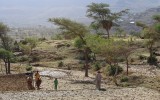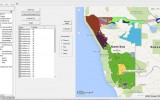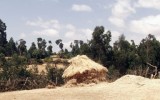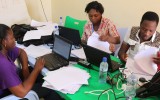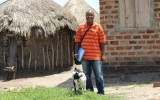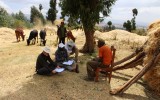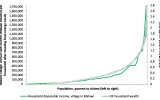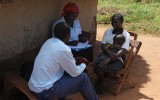Methods
Showing items 16 to 30 of 51
View Categories
- Areas of expertise
- Capacity building
- Climate change
- Data
- Disasters and emergencies
- Famine prevention and food security
- Gender
- Income diversification
- Inequality
- Lake Victoria fisheries
- Livelihood resilience
- Livelihood Zones
- Livelihoods
- Monitoring and evaluation
- Nutrition and health
- Open source
- Policy and programme design
- Post-conflict
- Poverty research
- Refugees and displacement
- Social protection
- Technology
- Urban
- Vulnerability assessment
- Countries
- Hydromet
- Methods
- Resilience
- The organisation
-
Banking on Evidence for Development – a month in the life of a volunteer
It’s August 2013 and I’m about as broke as a ‘banker’ in London can be. I had eagerly taken up my first position in the big city: interning at RBS’ risk department. That’s right, I had made it to the big time… And then rent happened… And bills… So with accrued holiday time but no […]
-
New HEA software developed by Evidence for Development
The household economy approach (HEA) is a method for assessing the vulnerability of rural populations to economic shocks and changes, based on their livelihood patterns and market information. It is now widely used as a method of famine early warning by many governments and humanitarian agencies, and also has important applications for managing the impacts […]
-
Postcard from Ethiopia: How to measure our impact
As an economist, I have always found it logical that NGOs should be expected to demonstrate the impact of their work. Once we have set our objectives, we need to know whether we are achieving them and how we might do better. That means measurement. At Farm Africa, we support smallholder farmers to increase their […]
-
Livelihood baseline assessment of Malian refugees in Burkina Faso: Quantitative analysis of household economies (2014)
This assessment was undertaken on behalf of UNHCR to provide baseline information on the livelihoods of Malian refugees in Burkina Faso, to identify opportunities for greater economic self-reliance, and to highlight risks and vulnerabilities of specific groups within the population. This report covers the three official refugee camps in Burkina Faso: Sag Nioniogo, Goudebou and Mentao.
-
Mobile data, measurement & evidence… what’s new?
As mobile data collection in remote regions and developing countries becomes more viable for development organisations, the robustness of the methodologies used must be considered in relation to the goal of evidence-based development. Expanded possibilities According to the UN International Telecommunication Union, “by the end of 2014, 55% of all mobile-broadband subscriptions are expected to […]
-
The Household Economy Approach: Managing the impact of climate change on poverty and food security in developing countries (2014)
Also available at: http://www.sciencedirect.com/science/article/pii/S221209631400031X
-
Oiling the relationship between evidence and policy: prioritising data quality and integrity
LSE’s recent JSRP conference on politics and evidence in international development highlighted problems inherent in the ways ‘evidence’ tends to be defined and used in mainstream development discourse and practice. How can Evidence for Development’s individual household method (IHM) and current involvement in the ‘Assessing Rural Transformations’ project inform the discussion and help to oil […]
-
Aid impact assessment and agricultural change: Researching ‘good enough’ qualitative approaches
Using public money to reduce global poverty is a tough enough ‘task’ even without having to account for each pound spent every five minutes. But aid professionals can hardly claim to be less susceptible to self-serving group-think than anyone else, and indeed the case for strong reality checks on aid expenditure will remain particularly strong […]
-
For richer, for poorer… inequality curves now look similar in the UK and rural Africa
Idly scanning the pages of the Observer on Sunday morning, this graphic caught my eye in Will Hutton’s article about inequality in Britain. Evidence for Development has a large collection of individual household income data from some of the poorest countries in Africa, and Hutton’s chart on wealth inequality in the UK reminded me […]
-
Helping to rebuild communities in northern Uganda
You might remember all the attention last year on stopping Joseph Kony and the LRA. For the past two weeks I’ve been with Self Help Africa (SHA) in a region of northern Uganda that was severely affected by the conflict – in many villages, a whole generation of young adults are missing – and there […]
-
Improving smallholder farmers’ livelihoods through mango production and marketing project baseline IHM assessment, Salima, Malawi (2013)
The purpose of the baseline survey was to provide information that will assist in the monitoring and evaluation of Mango projects implemented by Self Help Africa (SHA) in partnership with ANAMARC in Salima District, Malawi. The study used the Individual Household Method (IHM) for data collection and data analysis and included four whole village surveys, randomly selected for the assessment.
